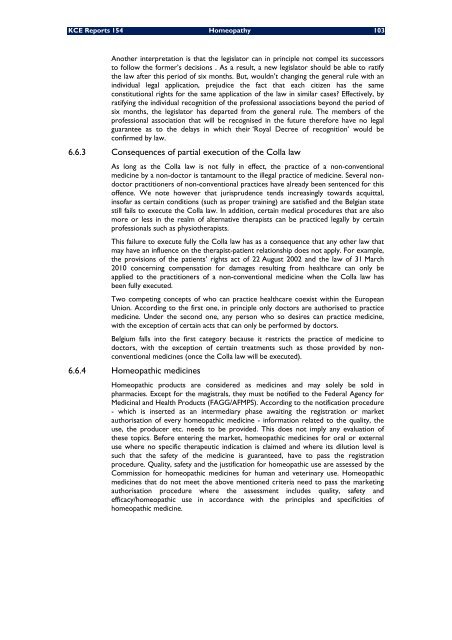Etat des lieux de l'homéopathie en Belgique - KCE
Etat des lieux de l'homéopathie en Belgique - KCE
Etat des lieux de l'homéopathie en Belgique - KCE
You also want an ePaper? Increase the reach of your titles
YUMPU automatically turns print PDFs into web optimized ePapers that Google loves.
<strong>KCE</strong> Reports 154 Homeopathy 103<br />
Another interpretation is that the legislator can in principle not compel its successors<br />
to follow the former’s <strong>de</strong>cisions . As a result, a new legislator should be able to ratify<br />
the law after this period of six months. But, wouldn’t changing the g<strong>en</strong>eral rule with an<br />
individual legal application, prejudice the fact that each citiz<strong>en</strong> has the same<br />
constitutional rights for the same application of the law in similar cases? Effectively, by<br />
ratifying the individual recognition of the professional associations beyond the period of<br />
six months, the legislator has <strong>de</strong>parted from the g<strong>en</strong>eral rule. The members of the<br />
professional association that will be recognised in the future therefore have no legal<br />
guarantee as to the <strong>de</strong>lays in which their ‘Royal Decree of recognition’ would be<br />
confirmed by law.<br />
6.6.3 Consequ<strong>en</strong>ces of partial execution of the Colla law<br />
As long as the Colla law is not fully in effect, the practice of a non-conv<strong>en</strong>tional<br />
medicine by a non-doctor is tantamount to the illegal practice of medicine. Several nondoctor<br />
practitioners of non-conv<strong>en</strong>tional practices have already be<strong>en</strong> s<strong>en</strong>t<strong>en</strong>ced for this<br />
off<strong>en</strong>ce. We note however that jurispru<strong>de</strong>nce t<strong>en</strong>ds increasingly towards acquittal,<br />
insofar as certain conditions (such as proper training) are satisfied and the Belgian state<br />
still fails to execute the Colla law. In addition, certain medical procedures that are also<br />
more or less in the realm of alternative therapists can be practiced legally by certain<br />
professionals such as physiotherapists.<br />
This failure to execute fully the Colla law has as a consequ<strong>en</strong>ce that any other law that<br />
may have an influ<strong>en</strong>ce on the therapist-pati<strong>en</strong>t relationship does not apply. For example,<br />
the provisions of the pati<strong>en</strong>ts’ rights act of 22 August 2002 and the law of 31 March<br />
2010 concerning comp<strong>en</strong>sation for damages resulting from healthcare can only be<br />
applied to the practitioners of a non-conv<strong>en</strong>tional medicine wh<strong>en</strong> the Colla law has<br />
be<strong>en</strong> fully executed.<br />
Two competing concepts of who can practice healthcare coexist within the European<br />
Union. According to the first one, in principle only doctors are authorised to practice<br />
medicine. Un<strong>de</strong>r the second one, any person who so <strong><strong>de</strong>s</strong>ires can practice medicine,<br />
with the exception of certain acts that can only be performed by doctors.<br />
Belgium falls into the first category because it restricts the practice of medicine to<br />
doctors, with the exception of certain treatm<strong>en</strong>ts such as those provi<strong>de</strong>d by nonconv<strong>en</strong>tional<br />
medicines (once the Colla law will be executed).<br />
6.6.4 Homeopathic medicines<br />
Homeopathic products are consi<strong>de</strong>red as medicines and may solely be sold in<br />
pharmacies. Except for the magistrals, they must be notified to the Fe<strong>de</strong>ral Ag<strong>en</strong>cy for<br />
Medicinal and Health Products (FAGG/AFMPS). According to the notification procedure<br />
- which is inserted as an intermediary phase awaiting the registration or market<br />
authorisation of every homeopathic medicine - information related to the quality, the<br />
use, the producer etc. needs to be provi<strong>de</strong>d. This does not imply any evaluation of<br />
these topics. Before <strong>en</strong>tering the market, homeopathic medicines for oral or external<br />
use where no specific therapeutic indication is claimed and where its dilution level is<br />
such that the safety of the medicine is guaranteed, have to pass the registration<br />
procedure. Quality, safety and the justification for homeopathic use are assessed by the<br />
Commission for homeopathic medicines for human and veterinary use. Homeopathic<br />
medicines that do not meet the above m<strong>en</strong>tioned criteria need to pass the marketing<br />
authorisation procedure where the assessm<strong>en</strong>t inclu<strong><strong>de</strong>s</strong> quality, safety and<br />
efficacy/homeopathic use in accordance with the principles and specificities of<br />
homeopathic medicine.

















